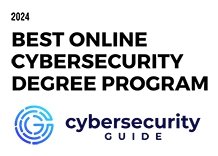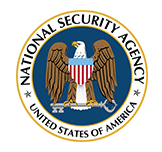
Bachelor of Science in Cybersecurity
Secure the Global Landscape
You know that as humankind’s reliance on information technology grows—and with it, the prevalence of cyber crime—the need for highly trained cybersecurity professionals remains increasingly valuable. Prepare yourself for the field with the needed computer forensics, compliance and knowledge and vulnerability management skills through Norwich University’s online Bachelor of Science in Cybersecurity program.

Receive a unique cybersecurity education experience unlike any other. As one of the first universities designated as a Center for Academic Excellence in Cyber Defense Education by the National Security Agency and Department of Homeland Security, your online classroom will be led by instructors with over ten years of cybersecurity experience who can provide you with one-on-one guidance throughout your experience at Norwich.
The demand for cybersecurity professionals like you is unprecedented. With your Norwich degree, you will strengthen your skills in critical thinking, communication and research and analysis. Hone the skills in your area of interest by choosing a concentration in computer forensics and vulnerability management or information warfare and security management.
You, at Norwich
Our approach to integrated curricula allows you to take courses in a wide range of subjects, as well as the opportunity to explore a specific topic of study in depth.
Transfer up to 90 semester credits and complete your degree in fewer than two years.
Several start dates per year offer you the ability to enroll when it fits your schedule.
Relevant electives, including Strategic Communications or Business and Professional Writing.
Accreditation & Recognition

Norwich University is accredited by the New England Commission of Higher Education (formerly the Commission on Institutions of Higher Education of the New England Association of Schools and Colleges, Inc.).

The National Security Agency and Department of Homeland Security have designated Norwich University as a Center of Academic Excellence in Cyber Defense Education.













